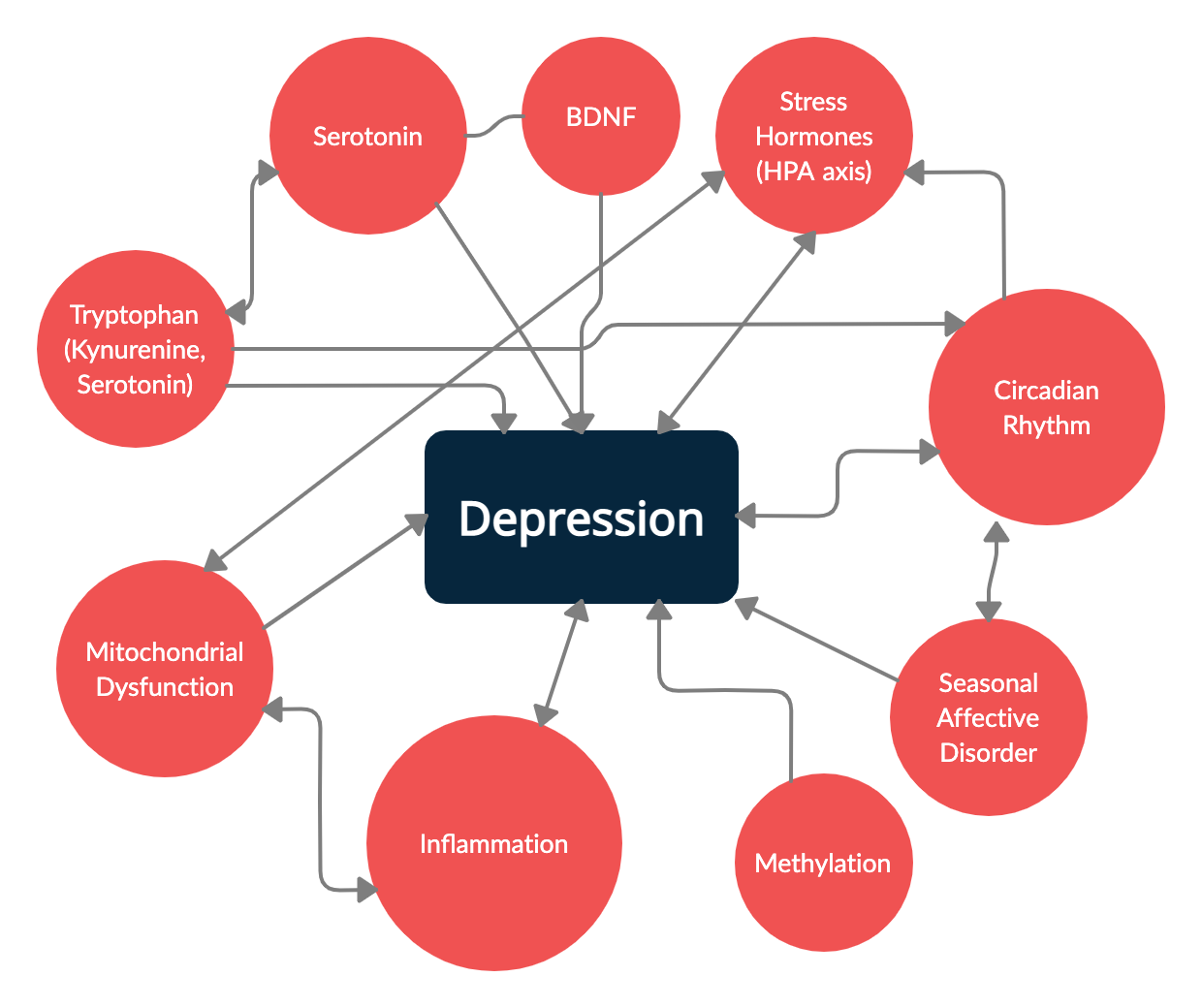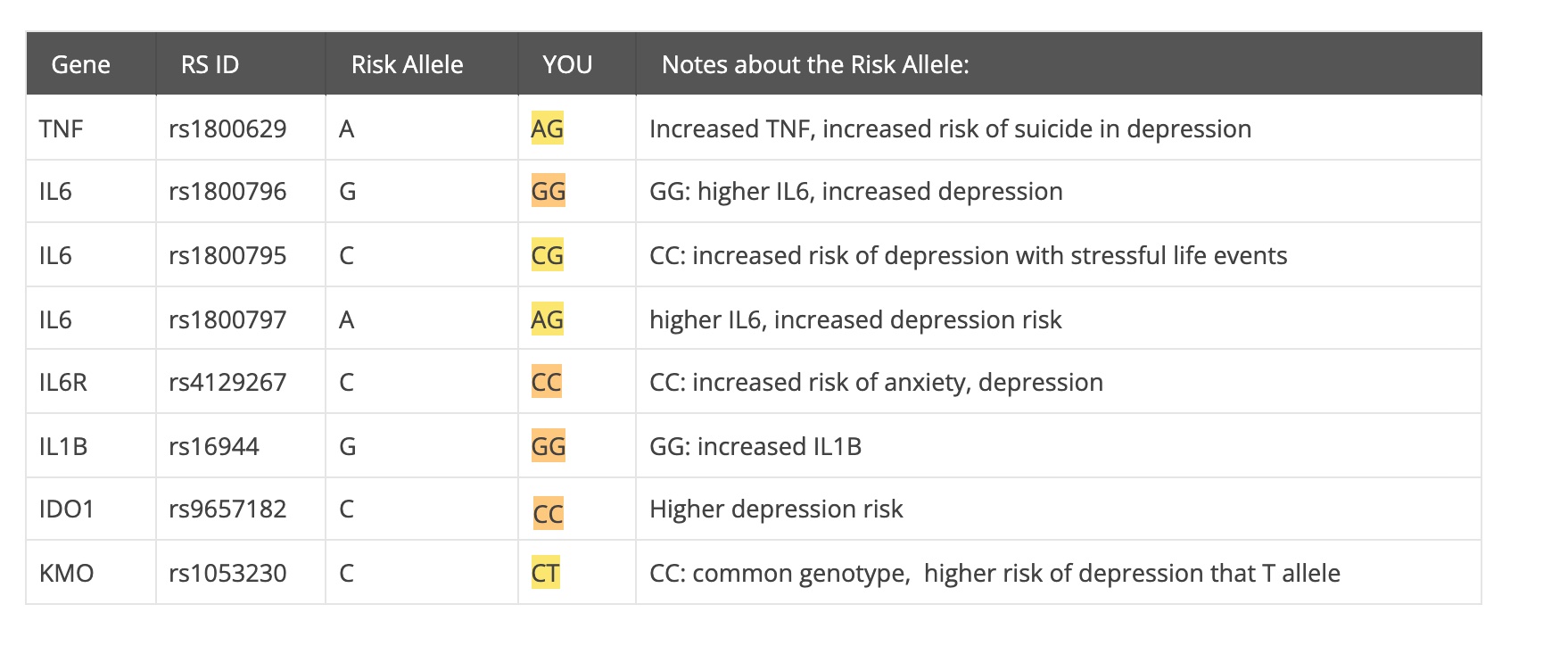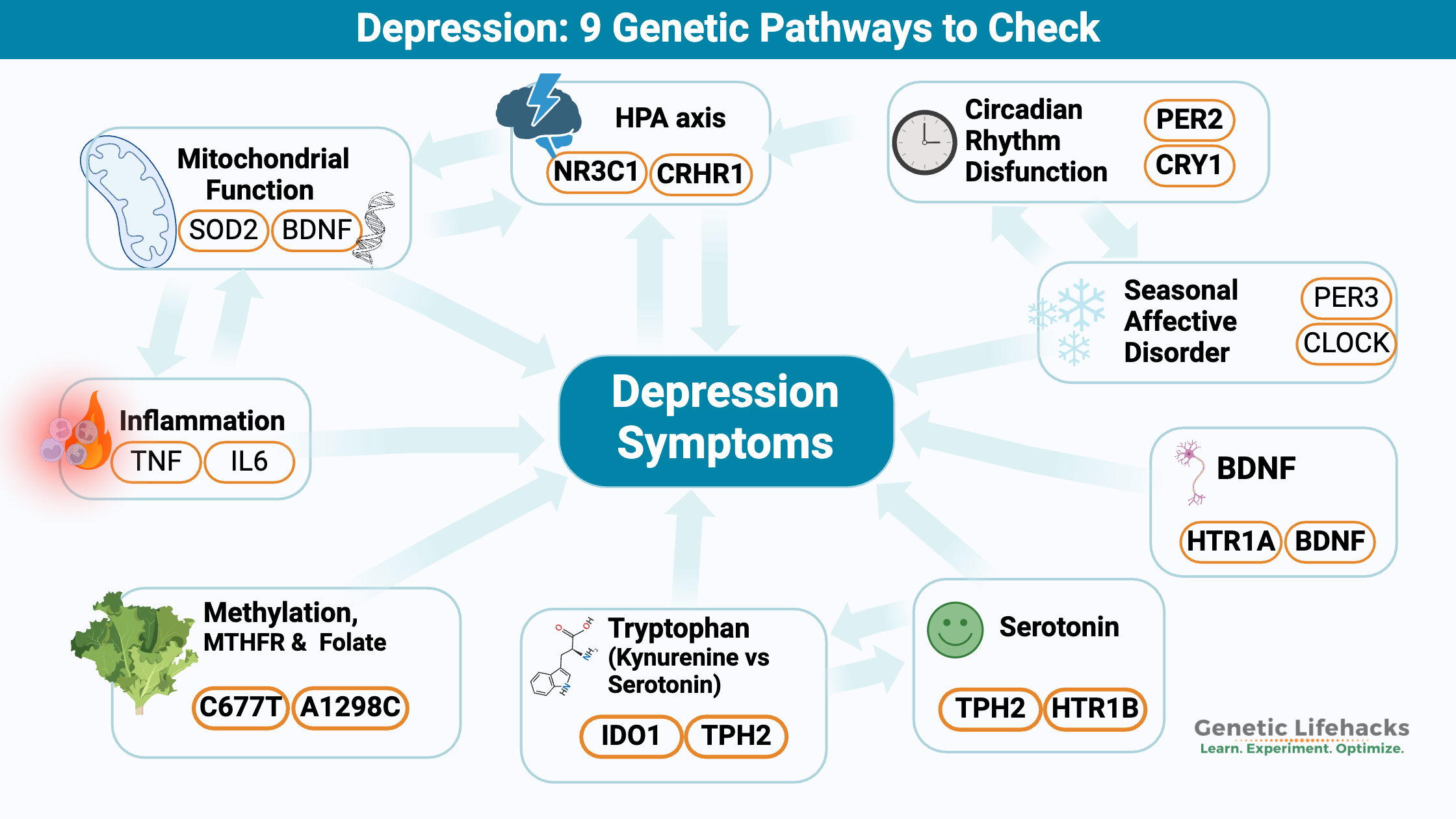When it comes to depression, there’s no one-size-fits-all answer. It’s not always easy to pinpoint the root cause of your depression, as different genetic factors, life events, and environmental factors can all play a role. My goal here is to simplify your task of sorting through genetic data to target the right cause(s) of depression for you.
Members will see their genotype report below and the solutions in the Lifehacks section. Consider joining today.
Depression: 9 genetic pathways to check
Genetics may be able to help you narrow down what is likely causing or adding to your depression on a physiological level.
Genomics is a good starting point!
- the place to start researching, learning about solutions
- a targeted way to make diet or supplement changes
- a starting point for talking with your doctor
That is an exciting concept! But I do want to point out a couple of caveats here:
- It’s important to keep in mind that your genetic data only shows part of your genome (23andMe, AncestryDNA).
- Genetics is only part of the picture. Your genes interact with your lifestyle, diet, abuse, chronic disease, etc — all coming together to change your neurotransmitters.
Caveats aside: USE what you can learn from your genetic data.
Can depression be genetic?
Genetics plays a role in depression for everyone, but there are multiple pathways that can cause the physiological changes that cause someone to feel depressed.
I’ve gone in-depth on all of theses genetic causes in separate articles (links below). In this overview article, you’ll be able to hone in on which of these root causes to target.
- Depression, genetics, and mitochondrial function
- Inflammation as a cause of depression
- Serotonin: How your genes affect this neurotransmitter
- Depression, Genetics, and Circadian Rhythm
- Tryptophan Genes: Serotonin, Melatonin, and Kynurenine
- MTHFR and Depression
- The Interaction Between BDNF and Serotonin
- Genetics of Seasonal Affective Disorder
- HPA Axis Dysfunction: Cortisol and Stress
What do I mean by root causes?
Recent research shows that for people with long-term psychiatric illnesses, such as major depressive disorder, bipolar disorder, or schizophrenia, there are structural changes that take place in the brain.[ref]
As you can see, genetics points to a number of root causes of depression. Some of these overlap and interact, so there isn’t necessarily a single genetic cause.
Here’s one way to look at the interconnected root causes of depression:

Pinpointing depression’s root cause:
If you have several variants highlighted in the articles below, this could indicate a physiological link to depression for you.
Most people will have one or two variants in the topics below. Some are really common variants. So what you are looking for is a bunch of variants, all pointing to the same cause.
Example case study:
If your Inflammation and Depression results show multiple risk alleles highlighted:

Steps to take:
- Read through the article on inflammation and depression.
- Look for sources of chronic inflammation such as eating junk food or exposure to toxicants and clean that up.
- Read through the Lifehacks section for suggestions on how to decrease inflammation specific to your genetic variants.
- Before implementing any supplement options, be sure to check with your doctor or pharmacist, if you are on any medications.
Depression Genotype Report: 9 Causes
Not a member? Join here. Membership lets you see your data right in each article and also gives you access to the members-only information in the Lifehacks sections.
Click the article link for further information, including the background science as well as research-backed solutions that match the genetic variants.
Inflammation and Depression:
When inflammation is chronically high, it can cause changes in neurotransmitters and in behavior. Think about how an animal acts when sick — it instinctively retreats from others, sleeps more, and seems sad. This is a hardwired mechanism when inflammatory cytokines are high.
Targeting inflammation may be a way to reduce depression and anxiety symptoms, for some people.
Remember – if you see a lot of highlights here, read through the full inflammation and depression article.
| Gene | RS ID | Effect Allele | Your Genotype | Notes About Effect Allele |
|---|---|---|---|---|
| TNF | rs1800629 | A | -- | Increased TNF-alpha |
| IL6 | rs1800796 | G | -- | GG only: Increased depression with inflammation |
| IL6 | rs1800795 | C | -- | CC only: Increased risk depression with stress |
| IL6 | rs1800797 | A | -- | Increased depression risk (Chinese pop.) |
| IL6R | rs4129267 | C | -- | CC only: Increased risk anxiety; depression |
| IL1B | rs16944 | G | -- | GG only: Increased IL1B; Increased risk depression |
| IDO1 | rs9657182 | C | -- | CC only: more likely to have depr. with inflammation |
| KMO | rs1053230 | T | -- | increased 3-OH-kynurenine, decreased risk of bipolar with psychosis (good) |
Depression, genetics, and mitochondrial function
Your mitochondria create most of the ATP that your cells use for energy. Without enough energy in your brain, depression symptoms can occur.
For some people with major depressive disorder, mitochondrial dysfunction in the brain is a physiological cause.
There’s a lot more to this topic than can be explained in two sentences, so if you see a lot of risk alleles highlighted below, jump over and read the full article.
| Gene | RS ID | Effect Allele | Your Genotype | Notes About Effect Allele |
|---|---|---|---|---|
| SOD2 | rs4880 | A | -- | AA only: higher chronic inflammation, increased relative risk of depression and psychological stress |
| GSTA1 | rs3957357 | A | -- | Low/ non-functioning enzyme; increased relative risk of psychiatric illness |
| BDNF | rs6265 | T | -- | TT: decreased BDNF; decreased hippocampus volume if exposed to early life stress |
| MTHFD1L | rs11754661 | A | -- | Increased risk of depressive rumination and increased lifetime risk of depression |
| ATP6V1B2 | rs1106634 | A | -- | Increased relative risk of major depressive disorder |
| FKBP5 | rs1360780 | T | -- | Increased relative risk for depression, incomplete cortisol recovery, and increased anxiety after psychosocial stress |
| FKBP5 | rs3800373 | C | -- | Increased relative risk of major depressive disorder |
| CRHR1 | rs110402 | G | -- | GG: elevated cortisol in people exposed to childhood trauma |
| CRHR1 | rs242924 | G | -- | GG: elevated cortisol in people exposed to childhood trauma |
| CRHR1 | rs242941 | A | -- | slightly increased relative risk of depression |
| CRHR1 | rs242939 | C | -- | increased relative risk of depression |
| TOMM40 | rs2075650 | G | -- | increased susceptibility to depression (mitochondrial membrane protein) |
Depression, Genetics, and Circadian Rhythm
For some, circadian disruption can be at the heart of depression or mood disorders.
| Gene | RS ID | Effect Allele | Your Genotype | Notes About Effect Allele |
|---|---|---|---|---|
| CRY1 | rs10861688 | T | -- | Increased risk of depression |
| CRY2 | rs10838524 | G | -- | Increased risk of depression |
| PER2 | rs934945 | T | -- | Increased severity; depression |
| PER3 | rs139315125 | G | -- | Increased risk of depression |
| PER3 | rs228697 | G | -- | Increased risk of depression |
| NPAS2 | rs11123857 | G | -- | Increased risk of depression |
| NR1D1 | rs2314339 | T | -- | Increased risk of depression |
| OPN4 | rs2675703 | T | -- | Increased seasonal depression |
BDNF, Serotonin, and Mood Disorders
Genetic variants in the BDNF and serotonin receptor genes combine to increase the risk of depression and anxiety. Learn more about BDNF and how these variants interact — and check your genetic data to see how this applies to you.
| Gene | RS ID | Risk Allele | YOU | Notes about the Risk Allele: |
|---|---|---|---|---|
| BDNF | rs6265 | T | — | Decreased BDNF levels |
| HTR1A | rs6295 | G | — | Increased risk of depression with BDNF variant |
Seasonal Depression
Seasonal Affective Disorder (SAD) is characterized by recurrent depression with a change in the season, usually in fall/winter for most. Scientists think this is possibly due to an aberrant response to light – either not enough brightness to the sunlight or not enough hours of light. Your genes play a significant role in this responsiveness to light.
| Gene | RS ID | Effect Allele | Your Genotype | Notes About Effect Allele |
|---|---|---|---|---|
| PER3 | rs139315125 | G | -- | Decreased PER3; increased risk of SAD |
| PER3 | rs150812083 | G | -- | Decreased PER3, higher risk of SAD |
| PER3 | rs228697 | G | -- | Evening preference; Increased risk of SAD |
| OPN4 | rs2675703 | T | -- | Greatly increased risk of SAD; responsive to day length |
| OPN4 | rs1079610 | C | -- | Attenuated response to light; earlier sleep/wake timing |
| CLOCK | rs1801260 | G | -- | Decreased risk of SAD; higher activity in evening |
| HTR2A | rs731779 | C | -- | CC only: singificantly increased risk of SAD |
Serotonin Genes
Serotonin is a neurotransmitter that is important in depression, sleep, and many other aspects of health. Learn how your genetic variants in the serotonin receptor genes impact their function.
| Gene | RS ID | Effect Allele | Your Genotype | Notes About Effect Allele |
|---|---|---|---|---|
| TPH2 | rs4570625 | T | -- | decreased risk of depression, less anxiety, and aggression, more likely to be honest |
| HTR1A | rs6295 | C | -- | C/C: higher impulsiveness, increased risk for depression |
| HTR1B | rs6296 | G | -- | increased risk of depression, anxiety after stressful life events, increased risk of childhood aggressive behavior, ADHD |
| HTR2A | rs6314 | A | -- | reduced serotonin 2A receptors in the prefrontal cortex, increased risk of social withdrawal |
MTHFR & Depression
The MTHFR gene codes for a key enzyme in the folate cycle.
| Gene | RS ID | Effect Allele | Your Genotype | Notes About Effect Allele |
|---|---|---|---|---|
| MTHFR C677T | rs1801133 | A | -- | 40-70% decrease in MTHFR enzyme function (folate metabolism) |
| MTHFR A1298C | rs1801131 | G | -- | 10-20% decrease in MTHFR enzyme function (folate metabolism) |
Tryptophan – Conversion to Serotonin vs. Kynurenine
Tryptophan is an amino acid that the body uses to make serotonin and melatonin. Genetic variants can impact the amount of tryptophan that is used for serotonin. It can influence mood, sleep, neurotransmitters, and immune response.
| Gene | RS ID | Effect Allele | Your Genotype | Notes About Effect Allele |
|---|---|---|---|---|
| IDO1 | rs3808606 | A | -- | AA only: more conversion to kynurenine |
| IDO1 | rs9657182 | C | -- | probably more conversion to kynurenine |
| KMO | rs1053230 | T | -- | Increased conversion to kynurenine |
| TPH2 | rs4570625 | T | -- | generally decreased risk of depression; less aggressiveness and lower anxiety |
| TPH2 | rs11178997 | A | -- | Increased risk of depression |
| TPH2 | rs1843809 | G | -- | Decreased risk of depression |
| TPH2 | rs4290270 | T | -- | TT only: circadian disruption in people with depression |
| IDO2 | rs10109853 | T | -- | Decreased IDO2 function |
| IDO2 | rs4503083 | A | -- | Decreased IDO2 function |
| IDO1 | rs7820268 | C | -- | C/C: 1.5-fold increased relative risk of MS |
Cortisol and HPA Axis Dysfunction
Cortisol is a hormone produced by the adrenal glands in times of stress, and it also plays many roles in your normal bodily functions. It is a multi-purpose hormone that needs to be in the right amount (not too high, not too low) and at the right time. Your genes play a big role in how likely you are to have problems with cortisol.
| Gene | RS ID | Effect Allele | Your Genotype | Notes About Effect Allele |
|---|---|---|---|---|
| NR3C1 | rs6189 | T | -- | Glucocorticoid receptor mutation linked to cortisol resistance |
| NR3C1 | rs6190 | T | -- | Glucocorticoid receptor mutation linked to cortisol resistance |
| NR3C1 | rs6198 | C | -- | Glucocorticoid receptor mutation linked to cortisol resistance |
| NR3C1 | rs56149945 | C | -- | Increased sensitivity to glucocorticoids;increased risk of obesity; hypertension |
| NR3C1 | rs41423247 | C | -- | Hypersensitivity to glucocorticoids |
| NR3C1 | rs6191 | A | -- | GR variant linked to some resistance to cortisol (minor) |
| NR3C1 | rs10052957 | A | -- | Linked to hypersensitivity to cortisol (minor) |
| NR3C2 | rs5522 | C | -- | Associated with resistance to cortisol; depression. |
| CRHR1 | rs110402 | G | -- | Elevated adult cortisol if exposed to childhood trauma; increased risk of depression or anxiety |
| CRHR1 | rs242924 | G | -- | Elevated adult cortisol if exposed to childhood trauma; increased risk of depression or anxiety |
| CRHR1 | rs242941 | A | -- | Increased risk of depression |
| CRHR1 | rs242939 | C | -- | Increased risk of depression |
| FKBP5 | rs1360780 | T | -- | Incomplete cortisol recovery; risk of depression; anxiety |
| FKBP5 | rs3800373 | C | -- | Incomplete cortisol recovery; risk of depression; anxiety |
| MC2R | rs1941088 | A | -- | low cortisol response |
| MC2R | rs28940892 | C | -- | Mutation linked to ACTH resistance (important) |
| SERPINA6 | rs11621961 | T | -- | Less cortisol binding globulin; lower plasma cortisol |
| SERPINA6 | rs941601 | T | -- | Less cortisol binding globulin; lower plasma cortisol |
| NR3C1 | i4990006 | C | -- | Increased sensitivity to glucocorticoids;increased risk of obesity; hypertension |
Bringing it all together:
To recap:
- Depression can have physiological causes along with triggering life events.
- Targeting the root physiological cause may help.
- If you are under the care of a physician, talk with your doctor/psychiatrist, especially before adding supplements in with medications.

A holistic view of depression treatment can include
- therapy (if needed)
- medications (if needed)
- diet
- lifestyle
- supplements (if needed)
Instead of just taking a stab in the dark, use your genetic data to formulate a plan. If you’re like me, writing down the plan can help. Here’s a printable form for keeping track of supplements.
Kind in mind that this process can take time, and you might find the need to switch up your strategy and plan. Resolving health questions can take a while, so be patient in finding what works best for you.
If you are in the US and find yourself or a loved one struggling with depression, you can call the national treatment referral service hotline (confidential): 1-800-662-HELP (4357) or visit the website. https://www.samhsa.gov/find-help/national-helpline.
Related Articles and Genes:
MTHFR and Migraines
The MTHFR C677T variant increases the risk of migraines. Learn how to check your genetic data and how to mitigate the risk.
PMS, Genetics, and Solutions
A lot of women know the moodiness and brain fog that comes with premenstrual syndrome (PMS). Studies estimate that PMS is up to 95% heritable – which means that it has a huge genetic component. Learn about the genes and find out which solutions may actually work for you. (Member’s article)
Serotonin Genes
Serotonin is a neurotransmitter that is important in depression, sleep, and many other aspects of health. Learn how your genetic variants in the serotonin receptor genes impact their function.
Histamine Intolerance
High histamine levels can cause a variety of symptoms including migraines, hives, sinus drainage, and stomach problems.

